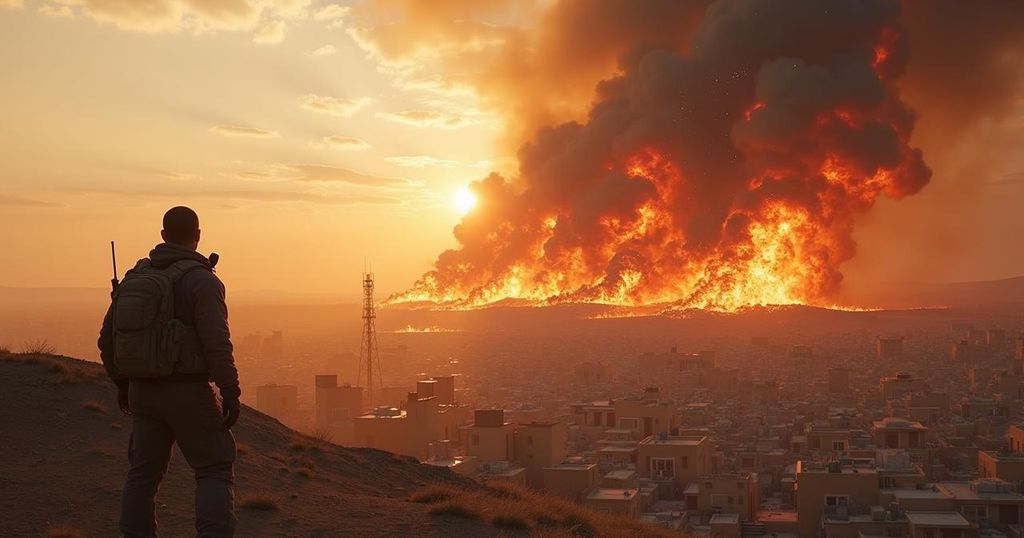UN Secretary-General António Guterres condemned the escalating violence in the Middle East, calling for an immediate ceasefire. His statement follows a series of missile attacks by Iran and Israeli military operations in Lebanon, as well as retaliatory strikes in Yemen. The situation reflects an increasingly volatile regional security landscape, exacerbated by the protracted Gaza conflict and cross-border hostilities.
On Tuesday, United Nations Secretary-General António Guterres issued a dire appeal for an immediate cessation of hostilities in the Middle East, remarking on what he described as an alarming pattern of escalating violence in the region. He condemned the widening conflict and emphasized the urgent need for a ceasefire, stating, “This must stop. We absolutely need a ceasefire.” The backdrop of his statement includes a recent surge in hostilities, notably the launching of multiple ballistic missiles by Iran toward Israel shortly after Israel executed a limited ground incursion into southern Lebanon. Reports indicate that around 180 missiles were fired, with most being intercepted by the Israeli military, and no immediate casualties were reported in Israel. These developments come on the heels of Israeli airstrikes targeting Beirut that resulted in the death of Hezbollah leader Hassan Nasrallah, amidst a backdrop of increasing violence and cross-border clashes. The tensions have been exacerbated by ongoing confrontations in Gaza, which has been embroiled in conflict for nearly a year now. The situation is reminiscent of the Israeli-Hezbollah hostilities from nearly two decades ago, which led to the formation of UN Security Council Resolution 1701 (2006), aimed at establishing lasting peace and increasing the presence of peacekeepers in Lebanon. Additionally, Israeli forces launched airstrikes in Yemen, purportedly in retaliation after Houthi rebels targeted Israeli cities with missiles and drones. The attacks did not significantly impair the infrastructure of the vital port city of Hudaydah, which remains crucial for humanitarian assistance in Yemen amid an ongoing civil war. According to Julien Harneis, the UN Resident and Humanitarian Coordinator in Yemen, both the Hudaydah and nearby Ras Issa ports are operational, although power supplies have been severely limited. As the situation develops, the UN continues to monitor humanitarian needs in the region, underscoring the criticality of humanitarian access in the face of rising conflict.
The current tensions in the Middle East have been fueled by a multitude of factors, including long-standing conflicts, recent military escalations, and the shifting dynamics involving key regional players like Iran and Israel. The situation has been particularly exacerbated by the ongoing conflict in Gaza, which has persisted for nearly a year, and has drawn in multiple countries and armed groups, leading to a volatile regional security environment. The repeated cross-border attacks between Israel and Hezbollah have raised alarms reminiscent of prior conflicts, prompting calls for international intervention to restore peace and stability. Furthermore, the humanitarian crisis in Yemen complicates the situation, as hostilities disrupt critical supply routes and humanitarian efforts.
In conclusion, the escalation of violence in the Middle East, as highlighted by recent military actions and cross-border tensions, has reached a critical juncture that necessitates urgent diplomatic intervention. The calls for a ceasefire by UN Secretary-General António Guterres emphasize the need for immediate action to prevent further loss of life and establish a pathway towards peace in a highly unstable region. Both the ongoing conflict in Gaza and the hostilities involving Iran and Hezbollah serve as reminders of the complexities and interconnected nature of these conflicts, which require coordinated international efforts to address.
Original Source: news.un.org






